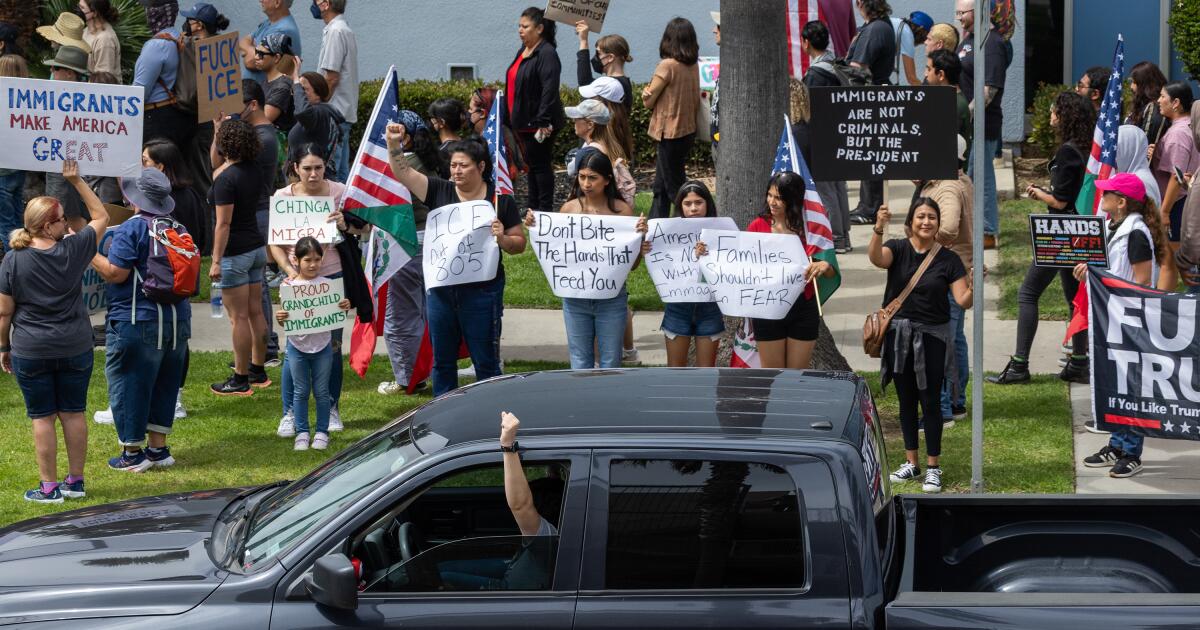Trump immigration raids intensify despite setbacks, bad polling
The Trump administration immigration sweeps that have roiled Southern California have shown few signs of slowing despite lawsuits, a court order and growing indications the aggressive actions are not popular with the public.
The operations, which began in early June in the Los Angeles area, largely focused on small-scale targets such as car washes, strip malls and Home Depot parking lots before authorities hit their biggest target last week — two farms for one of the largest cannabis companies in California. One worker died after falling from a greenhouse roof during the raid, while 361 others were arrested.
Responding to the death, President Trump’s chief border policy advisor, Tom Homan, called the situation “sad.”
“It’s obviously unfortunate when there’s deaths,” he told CNN. “No one wants to see people die.”
“He wasn’t in ICE custody,” Homan said. “ICE did not have hands on this person.”
Homeland Security Secretary Kristi Noem said authorities plan to intensify immigration crackdowns thanks to more funding from the recently passed “One Big Beautiful Bill Act” spending plan from Congress.
The budget bill infuses roughly $150 billion into Trump’s immigration and border enforcement plans, including funding for ICE and Border Patrol staffing, building and operating immigrant detention facilities, and reimbursing states and local governments for immigration-related costs.
“We’re going to come harder and faster, and we’re going to take these criminals down with even more strength than we ever have before,” Noem said at a news conference over the weekend. Trump, she added, “has a mandate from the American people to clean up our streets, to help make our communities safer.”
But there are some signs that support might be slipping.
A Gallup poll published this month shows that fewer Americans than in June 2024 back strict border enforcement measures and more now favor offering undocumented immigrants living in the country pathways to citizenship. The percentage of respondents who want immigration reduced dropped from 55% in 2024 to 30% in the current poll, reversing a years-long trend of rising immigration concerns.
While the desire for less immigration has declined among all major political parties, the decrease among Republicans was significant — down 40% from last year. Among independents, the preference for less immigration is down 21%, and among Democrats it’s down 12%, according to the poll.
The poll also showed that a record-high 79% of adults consider immigration beneficial to the country and only 17% believe it is a negative, a record low for the poll.
Meanwhile, a Quinnipiac University poll published in June indicates that 38% of voters approve of the way Trump is handling the presidency, while 54% disapprove. On immigration, 54% of those polled disapprove of Trump’s handling of the issue and 56% disapprove of deportations.
At the same time, growing legal challenges have threatened to hamper the Trump administration’s efforts.
On Friday, U.S. District Judge Maame Ewusi-Mensah Frimpong, an appointee of President Biden, temporarily blocked federal agents in the Southland from using racial profiling to carry out immigration arrests after she found sufficient evidence that agents were using race, a person’s job or their location, and their language to form “reasonable suspicion” — the legal standard needed to detain an individual.
But the Trump administration vowed to fight back.
“No federal judge has the authority to dictate immigration policy — that authority rests with Congress and the president,” said Abigail Jackson, a White House spokeswoman. “Enforcement operations require careful planning and execution; skills far beyond the purview or jurisdiction of any judge. We expect this gross overstep of judicial authority to be corrected on appeal.”
On Monday, the administration asked a federal appeals court to overturn the judge’s order, allowing it to resume the raids across seven California counties.
Legal experts say it’s hard to say just how successful the federal government will be in getting a stay on the temporary order, given the current political climate.
“This is different from a lot of the other kinds of Trump litigation because the law is so clear in the fact finding by the district court,” said Erwin Chemerinsky, dean of the UC Berkeley School of Law. “So if you follow basic legal principles, this is a very weak case for the government on appeal, but it’s so hard to predict what will happen because everything is so ideological.”
In the past, legal scholars say, it would be extremely uncommon for an appeals court to weigh in on such an order. But recent events suggest it’s not out of the realm of possibility.
In June, the U.S. Supreme Court ruled in favor of allowing the federal government to deport convicted criminals to “third countries” even if they lack a prior connection to those countries.
That same month, it also ruled 6 to 3 to limit the ability of federal district judges to issue nationwide orders blocking the president’s policies, which was frequently a check on executive power.
Still, it’s not an easy case for the government, said Ahilan Arulanantham, professor of practice and co-director of the Center for Immigration Law and Policy at the UCLA School of Law.
“I think one thing which makes this case maybe a little bit harder for the government than some of the other shadow docket cases is it really does affect citizens in an important way,” he said. “Obviously the immigration agent doesn’t know in advance when they come up to somebody whether they’re a citizen or a noncitizen or if they’re lawfully present or not.”
The continued sweeps have resulted in a wave of other lawsuits challenging the Trump administration. Amid the legal battles, there are also signs of upheaval within the federal government.
Reuters reported on Monday that the Justice Department unit charged with defending legal challenges to the administration’s policies, including restricting birthright citizenship, has lost nearly two-thirds of its staff.
The administration has also faced scrutiny from Democrats and activists over its handling of last week’s raids at the marijuana cultivation farms, which were part of a legal and highly regulated industry in California.
“It was disproportionate, overkill,” Rep. Salud Carbajal (D-Santa Barbara) said of the operation.
Rep. Jimmy Gomez (D-Los Angeles) criticized Trump for targeting immigrant farmworkers as the administration continues to publicly state that its targets are people with criminal records.
“How many MS-13 gang members are waking up at 3 a.m. to pick strawberries? O’yeah, zero! Trump said he’d go after ‘bad hombres,’ but he’s targeting the immigrant farm workers who feed America. Either he lied — or he can’t tell the difference,” Gomez wrote on X.
The White House clapped back in a post on X: “That ain’t produce, holmes. THAT’S PRODUCT.”
Over the weekend, Jaime Alanís Garcia, 57, the cannabis farmworker who was gravely injured after he fell off a roof amid the mayhem of the Camarillo raid, was taken off life support, according to his family.
Alanís’ family said he was fleeing immigration agents at the Glass House Farms cannabis operation in Camarillo on Thursday when he climbed atop a greenhouse and accidentally fell 30 feet, suffering catastrophic injury. The Department of Homeland Security said Alanís was not among those being pursued.
His niece announced his death Saturday on a GoFundMe page, which described him as a husband and father and the family’s sole provider. The page had raised more than $159,000 by Monday afternoon, well over its initial $50,000 goal.
“They took one of our family members. We need justice,” the niece wrote.
Times staff writers Sonja Sharp, Dakota Smith and Jeanette Marantos contributed to this report.



